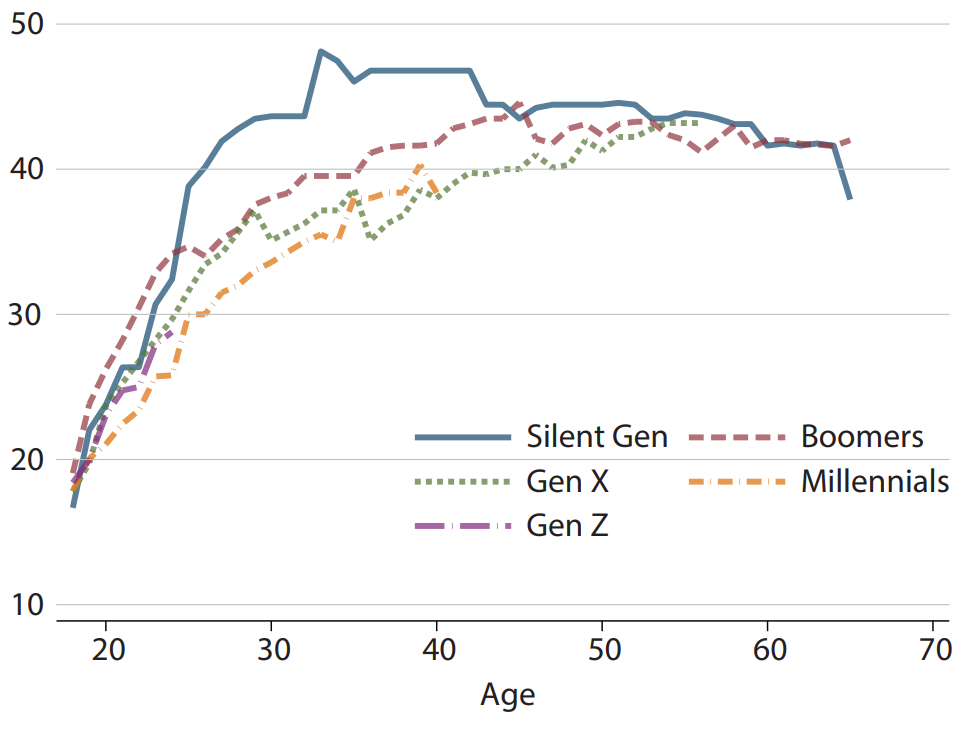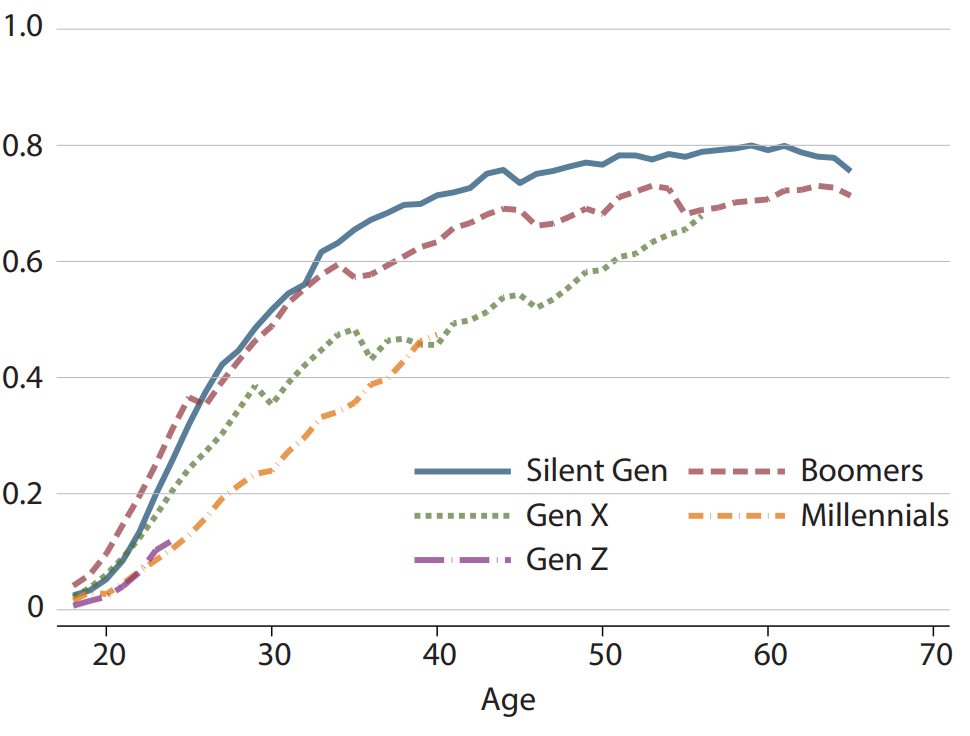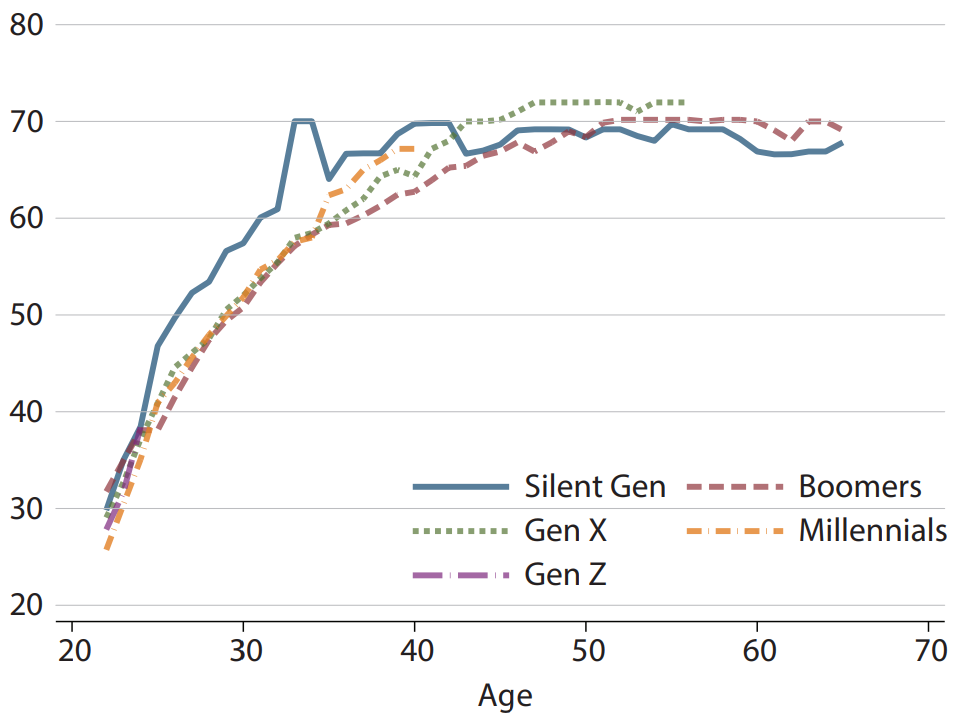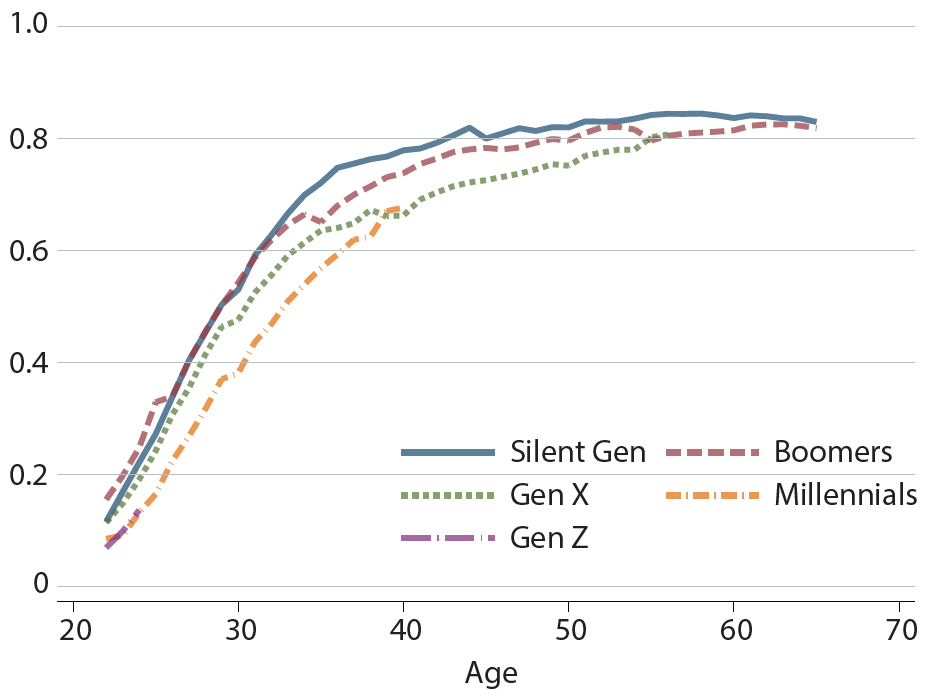Are There Generational Gaps in Income and Homeownership?
For people who were born after 1980, do they tend to earn less than their parents’ generation? And what about rates of homeownership—are they less likely to own a house?
In a July Economic Synopses essay, Victoria Gregory, an economist at the St. Louis Fed, addressed this question by examining real income and homeownership rates for different generations at different points in their lives.
To investigate the issue, Gregory used data from the Census Bureau’s American Community Survey, focusing on individuals whose incomes reflected full-time earnings for an entire year; the data were from 1950 through 2021. She also divided workers into four different generations, based on their birth year.
- Silent Generation (1928-1945)
- Baby Boomers (1946-1964)
- Generation X (1965-1980)
- Millennials (1981-1996)
- Generation Z (1997 onward)The author noted that Generation Alpha—those born after 2012—aren’t yet in the labor market.
She then looked at data for workers with no college education and for workers with a college education for each generation and tracked how the data varied during each generation’s working life cycle.
Income and Homeownership for Those without a College Education
The figure below plots the real median income for workers without a college education at specific ages for each generation, starting at age 18.
Median Income in Thousands of 2019 Dollars for Workers without a College Education

SOURCES: American Community Survey and author’s calculations.
Gregory pointed out that each generation’s median income starts low and steepens early in life before flattening out when people are in their late 30s.
However, she also observed that subsequent generations generally earned less than earlier generations at early ages.
For example, at age 30, the median millennial without a college education earned 23% less than the median member of the Silent Generation, 12% less than the median baby boomer and 4% less than the median member of Gen X, the author noted.
The next figure looks at homeownership rates for each generation at different ages.
Homeownership Rates for Workers without a College Education

SOURCES: American Community Survey and author’s calculations.
In terms of homeownership rates, Gregory pointed out that millennials also faced gaps with other generations. For example, at age 30, 49% of baby boomers without a college education owned homes versus 24% of similarly educated millennials at 30.
“Although these gaps are much more pronounced than the income gaps, it does suggest a link between lower lifetime income and the ability to save for a home,” she wrote.
Income and Homeownership for Those with a College Education
The next figure plots the real median income of college-educated workers (i.e., those with at least some college education) at specific ages for each generation, starting at age 22.
Median Income in Thousands of 2019 Dollars for Workers with a College Education

SOURCES: American Community Survey and author’s calculations.
Gregory noted that starting with the baby boomer generation, college-educated workers lacked the generational income gap found among workers without a college education. Up through age 35, millennials, Gen Xers and baby boomers earned the same; after age 35, Gen X and millennials earned more than baby boomers.
“The lack of an income gap (and even slightly higher incomes for later generations) among the college-educated is consistent with evidence that the returns on investing in college have increased over time; as a result, subsequent generations of non-college-educated workers earn less and less,” she wrote.
However, a generational gap appears when considering homeownership, as shown in the figure below.
Homeownership Rates for Workers with a College Education

SOURCES: American Community Survey and author’s calculations.
For example, at age 30, only 38% of college-educated millennials owned homes, Gregory pointed out. This was less than the 54% of similarly educated baby boomers at the same age and also less than the 49% of non-college-educated baby boomers at the same age.
“The fact that the homeownership gap persists for a subset of workers who do not also display an income gap suggests that differing incomes and labor market opportunities are only part of the story,” she wrote.
Gregory outlined some possible reasons why younger generations show a homeownership gap, such as higher student debt affecting the ability of college-educated workers to save for a house. She also cited recent economic downturns like the Great Recession and younger generations’ delay in getting married and having children, which are both linked to homeownership.
“Although it did take Gen X some time to catch up with Boomers in terms of homeownership, it appears that Millennials have begun to close the gap, and early data show that Gen Z are already ahead of Millennials,” she concluded.
Note
- The author noted that Generation Alpha—those born after 2012—aren’t yet in the labor market.
Citation
ldquoAre There Generational Gaps in Income and Homeownership?,rdquo St. Louis Fed On the Economy, Nov. 13, 2023.
This blog offers commentary, analysis and data from our economists and experts. Views expressed are not necessarily those of the St. Louis Fed or Federal Reserve System.
Email Us
All other blog-related questions

